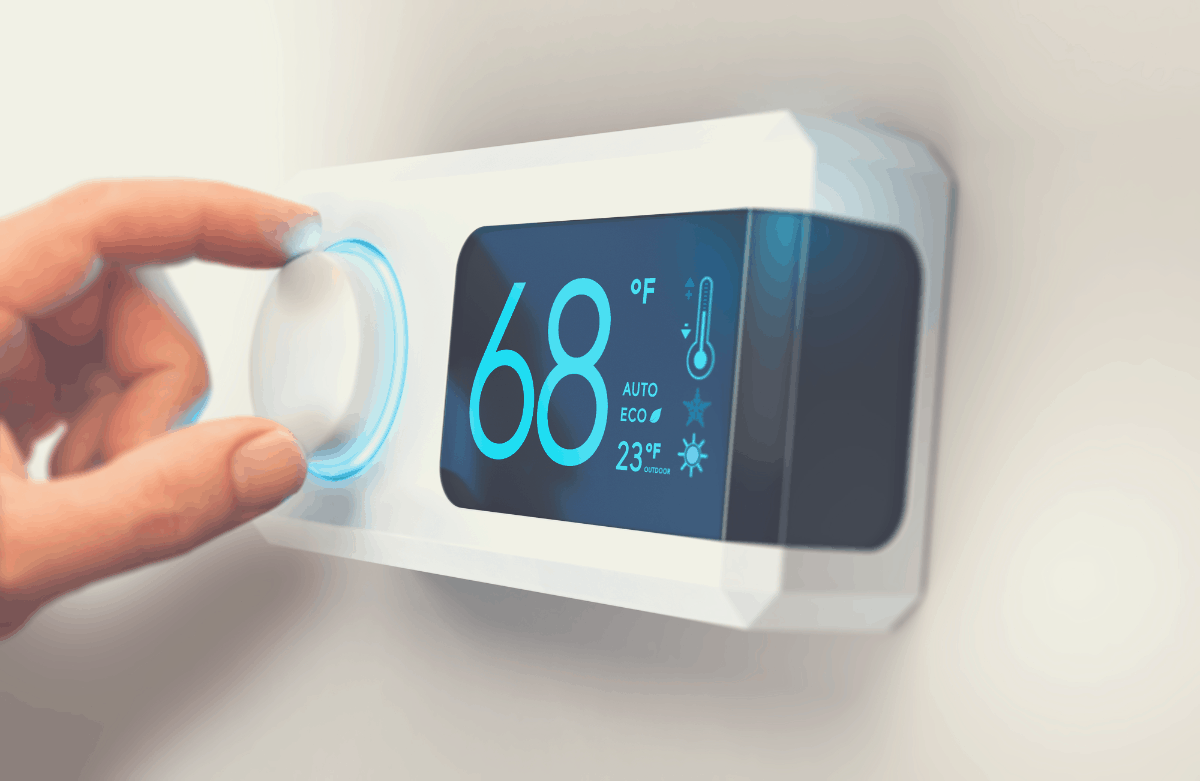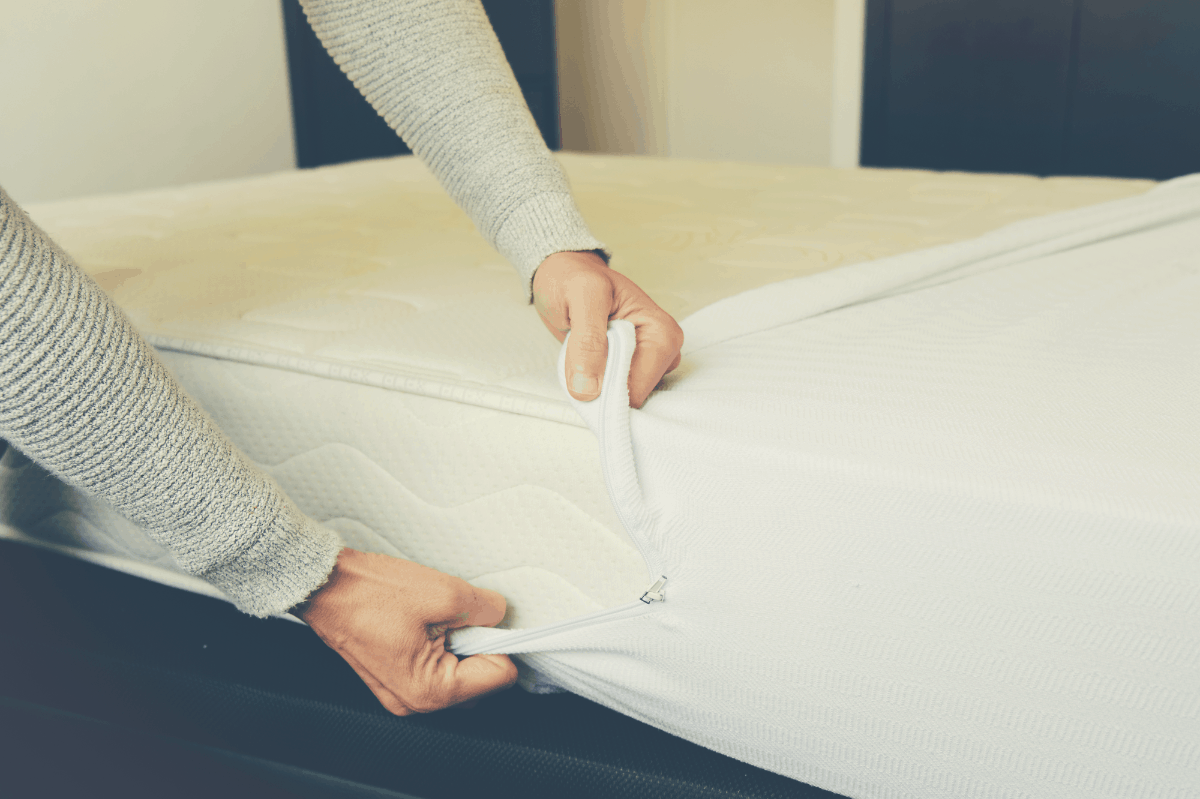With the majority of models carrying price tags that run into several hundred or thousands of dollars, a mattress can be a substantial investment. Waterproof protection is therefore non-negotiable for consumers who are serious about insulating their mattresses from stains, dirt, dust mites and allergens that can cause stains and other physical signs of deterioration.
Waterproof mattress protectors feature a membrane, usually made of vinyl, that serves as a protective barrier against urine accidents, sweat, and spills that can cause deep stains and damage to your expensive mattress.
Many consumers report increased night sweats due to this protective membrane, which is designed to keep the mattress dry at all costs. Additionally, this waterproof barrier can also be noisy, which can derail your chances of a good night’s sleep after a hard day’s work.
Why Do Mattress Protectors Make You Sweat?
Mattress protectors make you sweat because the waterproof barrier built into the protector inhibits the free flow of air, which can mean little to no temperature regulation in the sleeper’s body. As the body heats up in the middle of the night, the lack of air circulation from the bedding to the mattress can lead to an unbearably hot sleeping surface.
The result is increased sweating even in people who are naturally cool sleepers. For anyone who has always struggled with night sweats before using a mattress pad, the situation can only get worse.
No one likes to sweat at bedtime. When an intentional addition to your sleeping environment causes you to wake up drenched in sweat, it can be a major problem. Despite the many benefits of waterproof mattress protectors, even their biggest fans admit that they can increase the likelihood of sweating in bed. Are you one of those who are more prone to night sweats? Read on to find out what type of person you are.
Which Type of Person Are More Prone to Night Sweats?
It’s no secret that mattress protectors can contribute to night sweats. However, some classes of people sweat more compared to others. If you fall under any of the following classifications, a mattress protector may not be a good idea.
1. Hot Sleepers
Body temperature is biologically set to automatically cool down before sleep sets in for most people. However, there are some groups of people whose body temperature remains abnormally high throughout the night even after they fall asleep.
Natural heat sleepers may also feel hot in environments that might be cool for others. This can lead to profuse sweating when others show no such signs. Heat exhaustion is a hereditary condition for which there is no medical treatment.
If you are constantly sweating in bed despite running air conditioning or normal room temperature, a waterproof mattress protector may not be the best solution.
2. Menopausal Women
Hot flashes and night sweats are the two most common complaints menopausal women report. Sadly, even women who have slept cool all their lives may begin to experience those signs of discomfort after reaching that critical period.
The night sweats and hot flashes are caused by the constant changes in the levels of estrogen, progesterone, and other hormones. This typically inhibits the body’s natural ability to regulate its temperature leading to those unbearable levels of discomfort.
The last thing a menopausal woman with severe hot flashes may need is to go to bed on a waterproof mattress protector because it can affect the quality of her sleep significantly.
3. Diabetes
A common symptom in diabetics is waking up in the middle of the night drenched in sweat. Sometimes, the situation can even occur in cold weather when others may be freezing.
These night sweats occur due to the typical drop in blood sugar levels during the night, a medical condition known as nocturnal hypoglycemia. The often significant drop in blood sugar levels can lead to physical signs such as headaches and heavy night sweats.
For this reason, waterproof mattress protectors may not be a good idea for anyone diagnosed with diabetes.
However, if you need to sleep on a protector due to another pre-existing condition, such as incontinence, exercising early in the morning and avoiding alcohol can keep blood sugar levels stable at night.
This should translate into better sleep.
4. Medication

Have you been diagnosed with cancer and are being treated for other life-threatening conditions? If so, your prescription medications may be causing a spike in the rate of night sweats. It may be a wise decision to abandon your waterproof mattress protector in favour of mattress pads or another alternative.
Some antidepressants and other medications used to treat mental illness have also been linked to increased night sweats and discomfort.
Since these medications often need to be taken over a long period of time, not using a mattress protector can be a good solution. This simple step can lead to a significant improvement in your sleep.
5. Sleep Apnea
Obstructive Sleep Apnea is a medical condition caused by a blockage of a person’s airway during sleep. A constant cycle of starts and stops of breathing, resulting in loud snoring, is the main symptom of the condition.
Sleep apnea is associated with a significant increase in night sweats and other forms of discomfort. For this reason, once you have been diagnosed with obstructive sleep apnea, you should avoid using waterproof mattress protectors.
Did you read the article we wrote about Can Cats Have Sleep Apnea? Click on the link to learn more about the signs of the condition in cats and possible treatment steps.
Alternatives For Those Who Sweat On Mattress Protectors
Have you given up on mattress protectors for good because excessive sweating is hurting your chances of a comfortable night’s rest? Here are a few alternatives that can provide some protection for your mattress without negatively affecting your ability to enjoy restful nights.
1. Draw Sheets
These are special sheets designed for easy positioning and transfer of the injured, ill, or those with mobility issues. Draw sheets do not have a protective waterproof layer, but they are designed to absorb moisture produced by perspiration.
This can mean quality protection for your mattress from stains and leaks. The good news is that, unlike waterproof mattress protectors, draw sheets don’t exacerbate the risk of sweating during the night.
In addition, draw sheets are usually made of cotton or polyester, which can mean low friction, a cozy feel, and a great sleeping experience.
Amazon’s Position Pad Draw Sheet provides perfect absorption of fluids for incontinent patients. It is made of double-sided polyester fabric with reinforced heavy-duty handles that make it easier to transfer, reposition or lift patients.
2. Bed Pads
If you’re tired of tossing and turning all night because of using mattress protectors, why not switch to bed pads?
These pads can provide a protective layer for mattresses against sweat, stains, dirt, and dust mites without affecting how much a sleeper sweats. They can feature quilted polyester or cotton fabric that is extra soft to the touch to improve comfort during the night.
The extra padding can be useful for anyone who has an old mattress that provides only mediocre comfort and support.
Bed pads can also cover any hollows and valleys in your mattress while evenly distributing the sleeper’s body weight. The result is a better sleeping experience and a pain-free, happy awakening thanks to the absence of body aches.
Amazon’s EPICA Premium Quality Bed Pad creates a waterproof barrier to protect the mattress from spills as well as urine accidents. It is easy to wash and dry as well as extremely absorbent.
Five Tricks to Stop you Sweating at Night
Do you suffer from frequent night sweats as a result of sleeping on a mattress protector or other conditions such as diabetes, menopause or sleep apnea? Here are a few ways to keep night sweats at bay, regardless of the underlying cause.
1. Lower the Bedroom Temperature

Sleeping in a hot room is a surefire way to suffer from night sweats and the resulting discomfort. That’s why it’s important to keep the temperature in your bedroom cool, especially in the summer.
Turning on the fan or air conditioner is a proven way to keep the bedroom cool and comfortable even in the middle of a heatwave.
In the absence of an AC, opening the bedroom windows can also work well. The trick is to keep the windows open first thing in the morning. Then, plenty of cool air can circulate in the bedroom until nighttime.
Looking for natural ways to keep the bedroom cool? Cheque out the article we wrote about the 19 Ways To Keep Your Body and Your Bedroom Cool Without AC.
2. Wear Natural Fibers
Do you like to go to bed in some sort of pajamas? If so, then the choice of fabric can determine how much comfort you can get during the night. If you do this wrong, it can lead to night sweats that will affect your quality of life.
Look for pajamas made of cotton, merino wool, silk, and other natural fibers. They have a natural ability to regulate the sleeper’s body temperature. Synthetic fibers can worsen the sleeper’s body heat, causing significant stress that can keep you awake at night.
Therefore, they should be avoided at all costs, especially during the hot season.
3. Ditch Memory Foam
Memory foam offers many benefits, such as customized support and pressure point relief for the sleeper’s body. However, this innovative foam is temperature-sensitive, which means it can literally be a heat source to sleep on, especially in the summer.
Whether you’re a natural heat sleeper or struggling with the effects of menopause, memory foam can be a terrible option. The lack of proper air circulation in most of these models means that the sleeper’s body temperature can easily transfer to the mattress.
The result is a high level of sweating and discomfort throughout the night.
Since ordering the LUCID Latex Hybrid Mattress from Amazon 3 months ago, I have had a cloud-like sleeping experience. It provides an amazingly cool sleeping experience with no night sweats and discomfort, unlike my previous mattresses. It comes highly recommended.
4. Wool Blankets and Comforters
Wool blankets and down comforters can be lifesavers for those who suffer from frequent night sweats. Whether this is due to the use of some prescription medications or pre-existing medical conditions, wool blankets can be a good choice.
Wool is extremely breathable and has natural temperature regulating properties that keep you comfortable no matter what the thermostat reads. Additionally, the often lightweight nature of wool blankets can result in just the right amount of temperature control in the bedroom environment.
If you need to wrap a blanket around your body even in the summer, wool blankets may be the best option.
The EKTOS 100% Wool Blanket from Amazon has been the perfect addition to my bed since I discovered it last month. It’s super soft, odor-free, and provides exceptional temperature regulation in summer and winter.
5. Keep A Sleep Diary
Sometimes night sweats can result from the lifestyle choices we make in the hours before bedtime. For this reason, keeping a sleep diary can be key to uncovering specific actions that trigger these sweats so you can make the right choices to eliminate them.
The type of food you eat and the amount of physical activity you do around bedtime can be the reason for increased night sweats. Sleep diaries can help you identify specific routines that could be leading to these night sweats so you can make better decisions.
Conclusion
The plastic membrane component of waterproof mattress protectors can make you sweat even at low room temperatures. For this reason, these protectors may not be a good option for people who naturally sweat regardless of their sleeping environment.
Menopausal women and diabetics, in particular, should look for alternatives such as bed pads and draw sheets to reduce the risk of night sweats.
